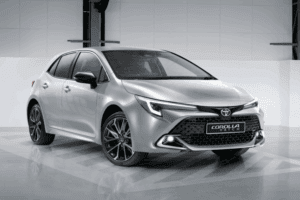The more mileage you rack up, the more the higher-priced hybrid comes into play.

The Toyota Corolla Cross has established itself as not only South Africa’s favourite SUV, but also new energy vehicle since making its introduction at the end of 2021.
The self-charging HEV (hybrid electric vehicle) is offered alongside the naturally aspirated 1.8 litre petrol variant as the two powertrains in the Corolla Cross’ line-up. The hybrid system consists of a combination of the 1.8 litre mill and an electric motor and battery pack.
While there might not be a massive difference in the two powertrains’ total output – 103kW/172Nm in the petrol compared to the hybrid’s 90kW/142Nm – the fuel consumption is the major dealbreaker.
It all comes down to consumption
Toyota claims the hybrid will only sip 4.3 litres per 100km, compared to the 6.8L/100km indicated for the petrol derivative. Seeing that the hybrid is more expensive than the internal combustion only-derivative, what this the difference in fuel consumption actually mean for the pocket of a potential buyer?
The Citizen Motoring dusted off the calculator (remember those that don’t make calls?) and did some number crunching to try and establish which powertrain option makes more sense from a pure budget point of view. We know the hybrid is a great offering, but around 60% of buyers have still opted for petrol derivatives since the start of 2024.
We compared the mid-spec XS petrol derivative to the XS hybrid, as the entry level Xi is not offered with a hybrid powertrain. The Corolla Cross 1.8 XS retails for R452 200 while the HEV XS is R42 200 more expensive at R494 400.
Corolla Cross HEV more expensive up front
If you finance the 1.8 over 60 months at prime interest rate (10.5%) with a 10% deposit and no balloon payment, the monthly instalment will be R8 842. This will include the initiation fee and monthly service fee.
If you get a similar finance deal (10% deposit structured over 60 months at prime with no balloon payment) on the HEV, the monthly instalment will be R9 658.
Insurance quotes for the two cars worked out to R833 for the 1.8 and as expected slightly more expensive hybrid for the hybrid at R865. This means that monthly finance and insurance works out to R9 675 for the petrol and R10 523 for the HEV.
ALSO READ: Toyota Corolla Cross leads uprise of new energy vehicles in Mzansi
Hitting the road
Now for the fuel consumption comparison. If we work on an annual mileage of 15 000km, the average monthly total will be 1 250km.
We used Toyota’s claim that the 1.8 sips 6.8L/100km and the official August inland 95 octane petrol price of R21.55 to work out that the petrol derivative will cost you R1 831 at the pumps per month.

The Toyota Corolla Cross HEV’s fuel bill using the claimed consumption of 4.3L/100km works out to R1 158, making it R673 cheaper than the 1.8. This price difference makes the total playing field including finance and insurance costs a lot more even, but the 1.8 still shades it by R192. The 1.8 will cost a total of R11 489 per month compared to the hybrid’s R11 681.
Higher mileage favours Corolla Cross hybrid
With every kilometre you travel less than 15 000km per year, the price will swing in favour of the petrol Corolla Cross. If your average annual mileage is 10 000km – or 833km per month – the 1.8’s total monthly cost be will be around R400 cheaper.
ALSO READ: Corolla Cross HEV takes the sting out of all the hybrid lingo
The more the annual mileage goes over 15 000km, the more the hybrid starts making sense. At around 1 600km per month, the two start breaking even. If you travel 30 000km per year or 2 500km per month, the HEV’s total cost of R12 839 will be R500 cheaper than that of the petrol.
If you buy a Corolla Cross cash and drive 15 000km per year, it will take almost 63 months for the HEV to break even with the 1.8 before you start cashing in on the fuel economy. The higher the mileage the sooner you’ll break even – 30 000km per year will make it less than 32 months. How much the HEV will save in the long run will depend on how long you hang onto it.
Average mileage deciding factor
The bottom line is that the less you travel the more sense the petrol derivative makes and the more you travel the more the hybrid comes into play. It should be a mind over matter decision once you start doing the maths.






